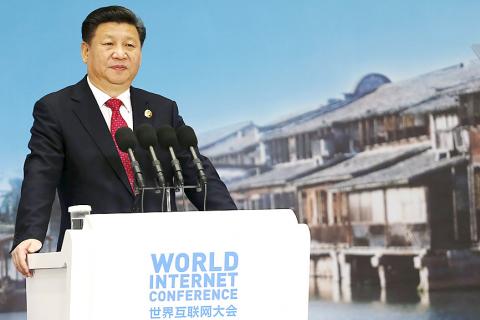Chinese President Xi Jinping (習近平) yesterday laid out his vision for the Internet, calling for a new “status quo” where Internet sovereignty rests in the hands of nations controlling the flow of information.
“Each country should join hands and together curb the abuse of information technology, oppose network surveillance and hacking, and fight against a cyberspace arms race,” Xi told China’s second World Internet Conference.
He said that would help fight online crime and terrorism and promote “healthy development” of the Internet.

Photo: Reuters
“Cyberspace is similar to the real world in that both freedom and order are necessary,” Xi added, saying Internet users’ rights to exchange views must be respected while maintaining order in accordance with the law.
The meeting was organized by the Cyberspace Administration of China, the Cabinet agency that enforces Internet controls.
Since Xi took China’s helm in early 2013, he has presided over a centralization of domestic Internet governance and broader efforts to control, and often censor, the flow of information online, experts say.
China infamously operates a “Great Firewall,” the world’s most sophisticated online censorship system, which blocks and attacks Internet services the government deems unsavory.
Critics of China’s Internet governance have said foreign tech companies should not lend Beijing credibility by agreeing to comply with its policies.
On Tuesday, the human rights group Amnesty International appealed to technology companies to resist Chinese initiatives that might curb freedom of expression or worsen human rights abuses.
“Under the guise of sovereignty and security, the Chinese authorities are trying to rewrite the rules of the Internet so censorship and surveillance become the norm everywhere,’’ Roseann Rife, Amnesty’s Hong Kong-based East Asia research director, said in a statement. “This is an all-out assault on Internet freedoms.”
“Tech companies, including Apple, Google, Facebook, LinkedIn and Microsoft, must be prepared to say ‘no’ to China’s repressive Internet regime and put people and principles before profits,” Rife said.
Others, including Reporters Without Borders and China censorship watchdog GreatFire.org, called for a boycott of the conference.
Organizers said about 2,000 people were due to attend the conference, including representatives of Apple, Facebook, Microsoft Corp, IMB, Alibaba Group Holding (阿里巴巴), Tencent Holdings (騰訊) and Baidu (百度), as well as Pakistani President Mamnoon Hussain and officials from Russia and Kazakhstan.
While Facebook and Twitter, among others, are blocked in China, that was not the case in Wuzhen, where attendees enjoyed unfettered access to Web sites.
“This is the place with the best Internet connection in China,” Kaspersky Lab chief executive Eugene Kaspersky said.
Additional reporting by AP

‘ABUSE OF POWER’: Lee Chun-yi allegedly used a Control Yuan vehicle to transport his dog to a pet grooming salon and take his wife to restaurants, media reports said Control Yuan Secretary-General Lee Chun-yi (李俊俋) resigned on Sunday night, admitting that he had misused a government vehicle, as reported by the media. Control Yuan Vice President Lee Hung-chun (李鴻鈞) yesterday apologized to the public over the issue. The watchdog body would follow up on similar accusations made by the Chinese Nationalist Party (KMT) and would investigate the alleged misuse of government vehicles by three other Control Yuan members: Su Li-chiung (蘇麗瓊), Lin Yu-jung (林郁容) and Wang Jung-chang (王榮璋), Lee Hung-chun said. Lee Chun-yi in a statement apologized for using a Control Yuan vehicle to transport his dog to a

Taiwan yesterday denied Chinese allegations that its military was behind a cyberattack on a technology company in Guangzhou, after city authorities issued warrants for 20 suspects. The Guangzhou Municipal Public Security Bureau earlier yesterday issued warrants for 20 people it identified as members of the Information, Communications and Electronic Force Command (ICEFCOM). The bureau alleged they were behind a May 20 cyberattack targeting the backend system of a self-service facility at the company. “ICEFCOM, under Taiwan’s ruling Democratic Progressive Party, directed the illegal attack,” the warrant says. The bureau placed a bounty of 10,000 yuan (US$1,392) on each of the 20 people named in

The High Court yesterday found a New Taipei City woman guilty of charges related to helping Beijing secure surrender agreements from military service members. Lee Huei-hsin (李慧馨) was sentenced to six years and eight months in prison for breaching the National Security Act (國家安全法), making illegal compacts with government employees and bribery, the court said. The verdict is final. Lee, the manager of a temple in the city’s Lujhou District (蘆洲), was accused of arranging for eight service members to make surrender pledges to the Chinese People’s Liberation Army in exchange for money, the court said. The pledges, which required them to provide identification

INDO-PACIFIC REGION: Royal Navy ships exercise the right of freedom of navigation, including in the Taiwan Strait and South China Sea, the UK’s Tony Radakin told a summit Freedom of navigation in the Indo-Pacific region is as important as it is in the English Channel, British Chief of the Defence Staff Admiral Tony Radakin said at a summit in Singapore on Saturday. The remark came as the British Royal Navy’s flagship aircraft carrier, the HMS Prince of Wales, is on an eight-month deployment to the Indo-Pacific region as head of an international carrier strike group. “Upholding the UN Convention on the Law of the Sea, and with it, the principles of the freedom of navigation, in this part of the world matters to us just as it matters in the